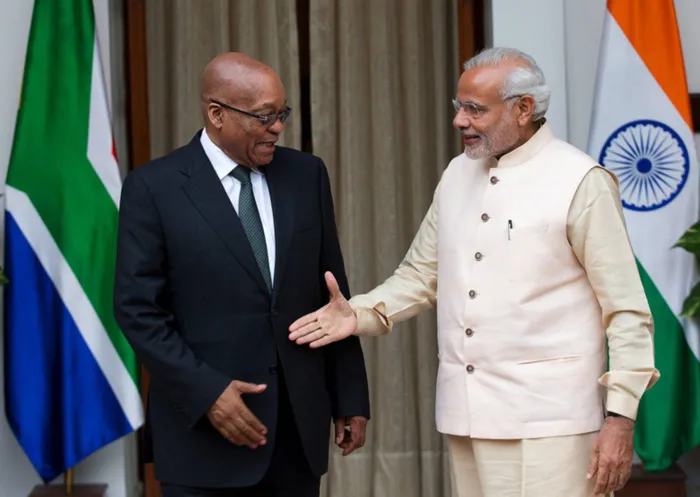
President Jacob Zuma and the Indian Prime Minister Narendra Modi. File picture: Manish Swarup President Jacob Zuma and the Indian Prime Minister Narendra Modi. File picture: Manish Swarup
Pretoria - The South African government seems to be leaning towards supporting India’s controversial bid to join the Nuclear Suppliers Group (NSG), an association of nations which control the trade in nuclear materials and technology, sources have told African News Agency.
India failed in its bid to join the NSG last month because it has acquired nuclear weapons and so is not a member of the 1970 Nuclear Non-proliferation Treaty, NPT.) The NPT is an international instrument which dictates that only the five nuclear powers of that time, may have atomic weapons.
Indian Prime Minister Narendra Modi is visiting South Africa for the first time this week and it is believed he will ask President Jacob Zuma to back India’s bid to join the NSG.
Sources say Modi will try to persuade Zuma that India only wants to join the NSG to acquire materials and technology for its peaceful, civilian nuclear power plants – and not its nuclear weapons programme.
In 2006, using that argument, the US persuaded the NSG to grant India an exemption which enabled it to buy such technology; Now India wants permanent membership of the NSG.
International Relations and Cooperation Minister Maite Nkoana-Mashabane was asked on Monday if she expected Modi to lobby Zuma for support and whether he would give it.
She noted that today all members of the NSG were also members of the NPT, but the added that in the one-on-meeting which Zuma and Modi would have this week, the NSG could come up.
Official South African sources say Pretoria is leaning towards backing Modi’s bid, because of South Africa’s strong friendship with India, including through their mutual members of alliances such as Brics (the Brazil, Russia, India, China and South Africa forum) and IBSA (the India, Brazil and South Africa forum)
However many disarmament advocates, including some in government, oppose India joining the NSG because they believe this will create a dangerous precedent that will undermine the NPT and encourage nuclear proliferation.
SA officials are also suggesting that the election of a new chairperson of the African Union Commission, which is scheduled to happen at the AU summit in Kigali, Rwanda on July 17 and 18, will be postponed until the next summit in January next year.
South Africa’s Nkosazana Dlamini-Zuma, who took the chair in 2012, has decided not to seek a second term and so is due to retire next month so AU leaders needed to find a replacement before that.
However officials have said that there is a widespread feeling that none of the three candidates who have been nominated are up to par and that a hunt is under way for a new candidate.
The three are from Equatorial Guinea, nominated by central Africa, from Uganda, nominated by east Africa and Botswana’s foreign minister Pelonomi Venson-Motoi, nominated by the Southern African Development Community (Sadc).
Sadc argues that since Dlamini Zuma is not serving a second term, Sadc is entitled to hold the post for the next four years.
However officials say Ecowas (Economic Community of West African States) has just written to the AU saying it cannot support Venson-Motoi, as her president Ian Khama hardly ever attends AU summits.
Other AU regions oppose her candidacy because they don’t like Khama’s foreign policy, including his vocal support for the International Criminal Court – which is a pariah to the AU – and for generally pro-Western views.
Ecowas has asked for the elections for the AU Commission chair and all other positions on the AU Commission, to be postponed until the next summit to allow time to find new candidates.
AU experts say it will require a two-thirds vote of leaders at the Kigali summit to postpone the elections. But SA officials expect it will happen.
Nkoana-Mashabane said she knew nothing about these developments and insisted that as a loyal member of Sadc, “South Africa is fully behind our Sadc candidate.”
She also announced that Zuma will undertake a state visit to France on July 11 to meet President Francois Hollande and to preside with him over the centenary commemoration of the World War 2 Battle of Delville Wood in France where hundreds of South African soldiers died.
Nkoana-Mashabane noted that in preparation for the centenary celebrations, the Delville Wood memorial had been transformed to recognise the historical role played by black South African soldiers in both world wars.
The minister ducked a question about whether Zuma and Hollande would discuss France’s bid to build SA’s proposed 9 600 megawatt nuclear power plant fleet.
But the nuclear bid is sure to be on the table.
The minister also dodged a question about the impact of Brexit on South Africa and the region.
“We don’t know about Brexit. We saw it on TV,” she said, adding that “we have heard it will have a negative impact on our trade with a number of countries of that region”.
African News Agency
